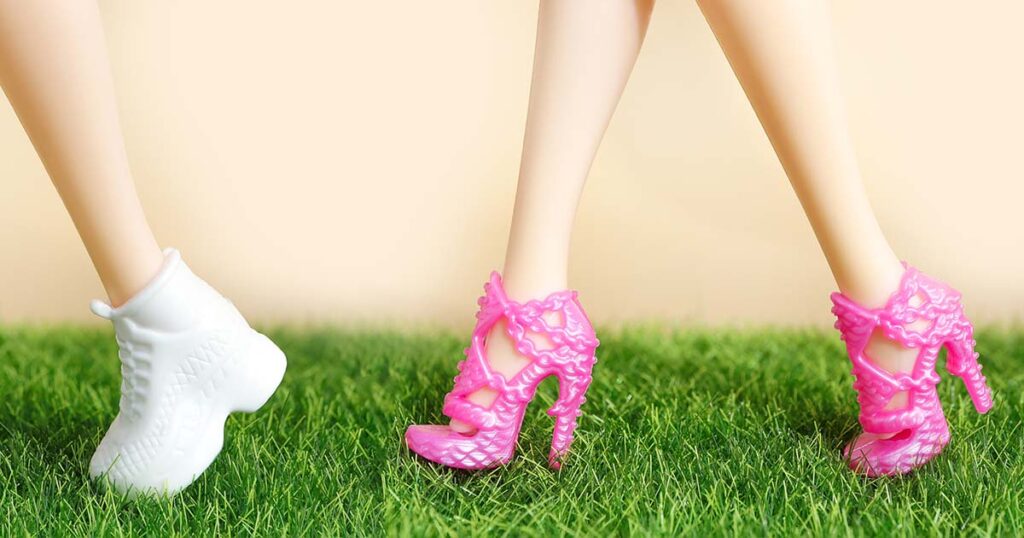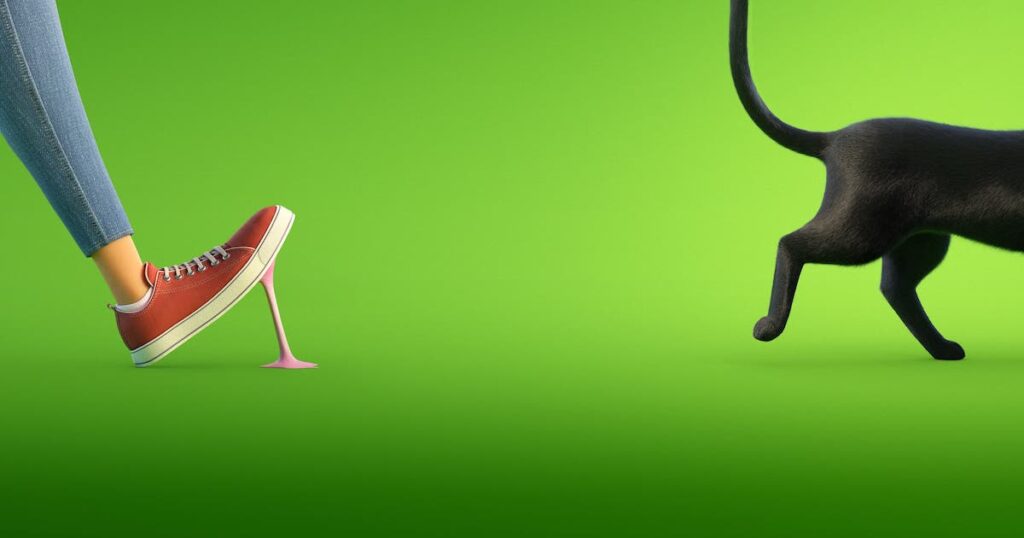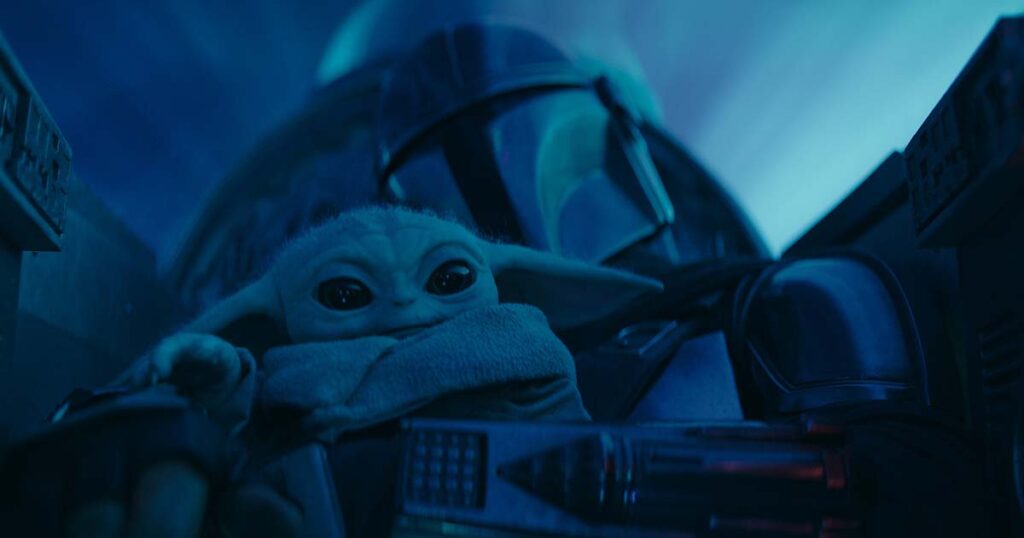[A review of Barbie (2023); rated PG-13 for language and adult themes; runtime 114 minutes; directed by Greta Gerwig; stars Margot Robbie and Ryan Gosling.]
If anyone could make a compelling movie about a Barbie doll, Greta Gerwig could.
Gerwig, an actress-turned-director, is known for her tender portrayals of girlhood, growing up and relationships between mothers and daughters. Though all those topics apply to Barbie in some way, this doll still seems like odd source material for a compelling movie. Yet the Barbie movie is now a blockbuster, popular not just for its Hollywood sparkle, but for its depth. (Note to parents: while Barbie is a children’s toy, the Barbie movie explores themes that are not for children.)
The whole Barbie brand is a conundrum. Common criticisms run like this: Barbie is a false ideal. Her beauty is unrealistic, and her endless line of clothes and accessories only promotes consumerism. Moreover, she’s overly sexualized and emblematic of ways in which women are objectified. The dolls that represent various careers (astronaut Barbie, doctor Barbie, etc.) don’t seem any less shallow. Instead, they belittle women and seem to say that women are no more than the sum of their looks and accomplishments. The criticism then continues one step further: though Barbie was invented to inspire girls, in reality she causes girls (and women) to despair, because it’s impossible to ever actually be as perfect as Barbie.
Writ large, the Barbie conundrum is really a human conundrum. We long for something ideal and perfect and good, but we all make massive mistakes about what is ideal and perfect and good. What’s more, we can’t live up to the false ideals we set for ourselves, much less the true ones. What is to be done?
Gerwig, who was an English and philosophy double major in college, is an astute student of the human condition, and her movie tackles this question with rollicking humor and a clever plot.
The movie’s satire reduces “adult discourse” concerning feminism and patriarchy to utter ridiculousness, instead suggesting that to truly understand the human condition, we must become like children, playing and laughing. The plot — a Stereotypical Barbie DollTM, who has never known anything but pink perfection, becomes human and enters the “Real World” — gives us a path forward from this humbling humor.
In order to be a good toy, Barbie must know what it’s like to be human. She must understand little girls and their mothers, experience change and rejection, feel sorrow and humiliation, as well as joy and gladness. Through these embodied, finite, creaturely experiences, Barbie transcends the petty identity politics that set up these false ideals of women (and men), instead reminding us that every single person is an irreducible miracle of incalculable worth.
Feminism and patriarchy, reductio ad absurdum
Barbie’s story begins with a lavish sequence depicting life in “Barbie Land,” where everything is perfect because it is plastic. But then, mysteriously, Barbie’s famous tip-toe feet go flat. Even worse, mid-disco-dance-number, Barbie asks her fellow dancing Barbies, for no apparent reason, “Do you ever think about dying?”
To cure her flat feet and rid herself of these thoughts of death, Barbie ventures into the “Real World” to find the little girl who is playing with her and causing these “malfunctions.” Ken, a stowaway in the backseat of Barbie’s pink convertible, tags along.
Los Angeles is the entry point into the Real World, and while there, Ken enjoys all the benefits of patriarchy, so much so that he sneaks back to Barbie Land to establish patriarchy there as well. Meanwhile, Barbie has her own awakening as a feminist, and after finding the mother and daughter to whom she belongs, she returns with them to Barbie Land to save it from the Kens.
This is the part of the movie that has gained such notoriety (or fame, depending on whom you ask) for being subversive, but it’s important to remember that both Barbie Land and the Real World are satirical (Will Ferrell plays the CEO of Mattel, and Kate McKinnon is Barbie Land’s sage, after all). Though the movie’s criticism of patriarchy is the more obvious, it takes feminism to task with equal severity.
In the end, Barbie Land is not the true ideal; rather, it is a false vision of perfection and as problematic as the Real World. Patriarchy in the Real World and feminism in Barbie Land are both cast as power plays that reduce the opposite sex to an accessory. The results, though portrayed comedically, are devastating: Men in the Real World are lewd to Barbie; women in Barbie Land are dismissive of Ken.
With Ken, the movie’s satire reaches a fever pitch. Ryan Gosling’s Ken cuts a figure as comic and ridiculous as Mrs. Bennet in Jane Austen’s Pride and Prejudice or Malvolio in Shakespeare’s Twelfth Night. And what he represents — a form of masculinity reduced to beer, horses and The Godfather — is the inversion of how the Barbie brand reduces femininity to purses, high heels and pink. Obviously, these are poor definitions of men and women.
It doesn’t matter whether the Barbie brand is interpreted as a patriarchal reduction of women or a feminist manifesto. Both interpretations fail to account for what is essential to humans, and neither of these abstractions are up to the task of defining what is really good. It will take Barbie’s human experience to do that.
Barbie’s tears
The movie’s outrageous satire is offset with many tender, sincere moments that offer some guidance through the Barbie conundrum. How do we know one another aright? How do we know what is truly good?
One scene puts the Barbie conundrum in the mouth of a middle-schooler named Sasha, the girl Barbie belongs to. After a few escapades in the Real World, Barbie finally finds Sasha in her school cafeteria. She bounds up to Sasha and introduces herself, but this too-cool middle-schooler is unimpressed.
Showing off to her other pals sitting around her at the lunch table, Sasha launches into a tirade criticizing Barbie for all she represents: She sets up a false ideal of woman, defined by consumerism, sexism, even fascism. Barbie, humiliated, bursts into tears. Who wouldn’t? Those comments were cruel. Her life’s work was just shot down by the girl she was made for.
Furthermore, Sasha criticizes Barbie with no understanding of the things she is saying. The Barbie conundrum — and words like fascism and sexism — would never cross a child’s mind. And however seriously Sasha means this criticism, it’s hard to take her seriously. Only a child who is trying to be like an adult by parroting the things she reads on the internet would talk this way.
The final twist to this scene is that all these criticisms of Barbie, the doll, are actually in this moment being made of Barbie, the human. Sasha’s immature tirade makes it painfully obvious how blinkered we are if we talk only in terms of “isms”; they fall so far short of accounting for actual human experience and leave so little room for charity and grace toward each other. Barbie’s tears are a reproach.
In another scene, Barbie sits at an ordinary bus stop somewhere in Los Angeles, observing things going on around her as a child would. She watches cars going by, children playing, a couple fighting, a young man sitting alone with his head in his hands. Barbie finds herself tearing up. She then turns to the 90-year-old woman sitting next to her on the bench. “You are beautiful,” Barbie says to her. “I know it,” the lovely old woman replies. Barbie recognizes the humanity of the woman next to her with the clear-sightedness of a child. Amid a lot of absurd comedy, it is a completely sincere and disarming moment. It shows us exactly how we should all see one another.
On futile quests for identity and life in Christ
So far, I’ve interpreted the movie very much on its own terms. What’s a Lutheran to do with this zany blockbuster?
Not every joke landed. There were plot holes and awfully weak characters (Sasha’s father comes to mind). Some of the dialogue’s more sanctimonious lines certainly came across as Mattel’s marketing ploy to rebrand itself so that Gen Z would proudly display Barbie stickers on their MacBooks. And of course, the parts that felt like marketing undermine the movie’s deeper points about identity and what it means to be human. Christians especially should know that we are so much more than the brands we buy.
And at the end of the day, the movie’s worldview (some variety of secular humanism with a Stoic twist) falls far short. However, the movie does recognize — and condemn, resoundingly — our futile attempts to define ourselves by our possessions and personal ideologies. These are all ways in which we set ourselves up as gods, and ultimately, declare ourselves independent of the one true God.
Of course, a secular movie does not actually say that much, and the best alternative it can offer to this futile quest for identity is an appeal to memory (without spoiling too much more, this is how the movie ends): Your identity will live on in your children, so live a good life so that your children will remember and imitate you. The world will be a better place that way. It’s not a terrible conclusion, but it is lacking.
Christian men and women, on the other hand, can leave the theater with the comfort of knowing they share a common identity in Christ alone. We also have the comfort of knowing that no brand or ideology has the ability to declare us righteous — none of these idols died on the cross for us. So, each day we repent of our attempts to invent new ways to define ourselves and remember that any identity outside of Christ makes us less than what we are: baptized children of God, redeemed by Him.
Image: Getty Images





This is the best review I have read on the the movie. I never planned to watch it as I had my own misgivings about what it would portray. But you have given a fair understanding of both the creators’ ideas and how a Christian should find their identity in Him alone.
Thank you for a concise review without condemning those wanting to be entertained by the movie.
You didn’t miss anything. The entire movie looked like a Pepto Bismol Pin Explosion. The was nothing un-Christian about it, it was just stupid.
Very accurate and thorough review! I’m sharing this with all my family members. Thank you!